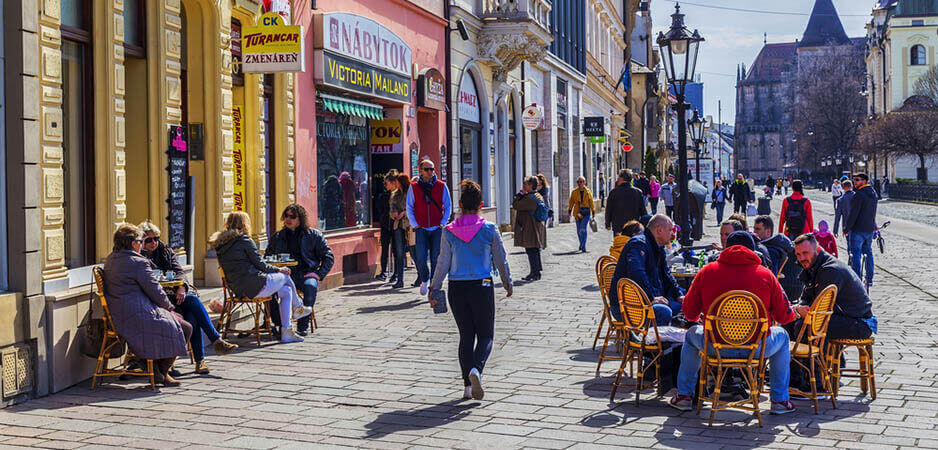Is there any hope that the European elections will bring positive change for Slovakians?
This year marks the 15th anniversary of Slovakia’s accession to the European Union. But in Svidník, only a few people bother.
Located in the northeast, Svidník is the main city of one of the poorest and least developed regions in the country. Only here in the first round of the recent presidential election did the majority of voters back Štefan Harabin, a right-wing populist. Harabin, however, didn’t get through to the next round, where two pro-European candidates, Zuzana Čaputová and Maroš Šefčovič, competed. Čaputová, a lawyer and activist with liberal views, ultimately beat her opponent, Vice President of the European Commission Šefčovič. From mid-June, she will be the country’s first female president and, at the age of 45, also the youngest.
On May 25, the voter turnout at the European elections in Svidník will probably be lower than 15%. Yet throughout Slovakia, people have long kept away from the ballot box. In all three European Parliament elections, in 2004, 2009 and 2014, Slovakia trailed every other country on turnout with only 17%, 20% and 13% casting their vote respectively. Even this year’s presidential elections had only about 42% turnout in the second round.
There is no easy answer for that. One factor is that Slovakia is mired in corruption — and the EU is to blame, too. In theory, EU funds were supposed to reduce regional disparities. As practice showed, though, a system of clientelism has entrenched itself, with politicians directing funds at businesses that can later prove useful in mobilizing electoral support. In Slovakia, scandals over the misuse of funds are so common that a new word was made up: “tunelovanie,” meaning to siphon off taxpayer money.
In places like Svidník, the EU is seen as part of the problem, not the solution. The whole northeastern region has no railway network, and the largest employer in the city is the hospital. The region shifted only slightly from 46% to 52% in GDP per capita from 2007 to 2016, which is far below all the other regions in the country. Every year, some hundred people leave Svidník to find well-paying jobs elsewhere.
Almost one-third of young people are Euroskeptic
At first glance, it seems to be a generation divide. The older generations with experience under communism tend to think the economy — which keeps wages and pensions for Slovaks below the EU average — was better off before accession. But that young people overwhelmingly support the EU is a myth. According to a 2017 Bertelsmann Stiftung’s survey, almost 30% of persons aged 15 to 24 think Slovakia’s membership is a bad thing. Many of those group around the neo-fascist People’s Party Our Slovakia (LSNS), which sees NATO as a criminal alliance and wants Slovakia to leave the EU.
Euroskeptics benefit from a storm of domestic factors — an unhealthy political system dominated by elite groups of politicians and murky businessmen, widespread corruption, poor public services, frustration and lack of perspectives — to win hearts of, especially, rural residents. The sad paradox is that all of these misdoings are associated with the most pro-European party in parliament, the SMER-SD, which is economically left, socially right and has been in power for 11 of the past 13 years.
“At the beginning, SMER-SD … raised hopes as a new breed of party: different, untainted by scandals,” said Radovan Olejár, a local businessman who is a former member of the party. “Soon it turned out [that] it’s influenced from behind the scenes by shady businessmen and has no interest in conducting real changes.”
However alarming the current situation may be, it would be good to take on a wider perspective. After all, Slovakia started from a different point than Poland, Hungary or the Czech Republic. In the 1990s, the tight control of the powerful Prime Minister Vladimir Mečiar over the economy and public institutions, his obscure contacts with local mafia and nationalistic rhetoric accounted for an image of Slovakia as “a black hole in the heart of Europe,” in the words of then-US Secretary of State Madeleine Albright.
 Over the next years, the country has changed significantly. It didn’t fail to develop along Western lines, as many feared when comparing Slovakia to Ukraine or Serbia. Since it joined the EU in 2004, its economy has generally boomed and living standards have gone up steadily. Today, it is the only eurozone member among the Visegrád states and, unlike euroskeptic Hungary or Poland, the majority of its citizens want to move closer to the “core of the EU.”
Over the next years, the country has changed significantly. It didn’t fail to develop along Western lines, as many feared when comparing Slovakia to Ukraine or Serbia. Since it joined the EU in 2004, its economy has generally boomed and living standards have gone up steadily. Today, it is the only eurozone member among the Visegrád states and, unlike euroskeptic Hungary or Poland, the majority of its citizens want to move closer to the “core of the EU.”
Although for people in Svidník it may be a cold comfort, Slovakia has made a huge step forward. This progress is proved by its high score in the Bertelsmann Stiftung’s Transformation Index BTI. The country was given 8.60 and 8.57 (out of 10) points in political and economic transformation respectively.
Progressive forces are on the rise
Slovakia is still riding a wave of activism inspired by massive protests that erupted after the murder of investigative journalist Ján Kuciak and the stunning victory of Čaputová in the presidential election. Čaputová has promoted herself as a face of a new generation of leaders. In a recent poll, Progressive Slovakia (PS) and TOGETHER – Civic Democracy, two non-parliamentary parties that group together this new generation and have backed Čaputová, jumped from 7.5% to 14.4% of support and are poised for second place in the European elections.
There has been “high demand for change,” Irena Bihariová, a PS deputy chairwoman, told this author. “It can either turn into the rise of anti-elite movements or, as in our case, a constructive alternative to those who defend the status quo.”
If this trend continues, Slovakia may become a rising force to halt the spread of right-wing populism across central Europe. Unlike Hungary or Poland, its pro-European elites are on the rise. Yet it is too soon to call Slovakia a liberal and progressive avant-garde in the region. The first task for new elites is to draw rural residents — who feel largely ignored by all the democratic governments — closer to the mainstream of society and make the EU sexy again all over the country.
The views expressed in this article are the author’s own and do not necessarily reflect Fair Observer’s editorial policy.
For more than 10 years, Fair Observer has been free, fair and independent. No billionaire owns us, no advertisers control us. We are a reader-supported nonprofit. Unlike many other publications, we keep our content free for readers regardless of where they live or whether they can afford to pay. We have no paywalls and no ads.
In the post-truth era of fake news, echo chambers and filter bubbles, we publish a plurality of perspectives from around the world. Anyone can publish with us, but everyone goes through a rigorous editorial process. So, you get fact-checked, well-reasoned content instead of noise.
We publish 2,500+ voices from 90+ countries. We also conduct education and training programs
on subjects ranging from digital media and journalism to writing and critical thinking. This
doesn’t come cheap. Servers, editors, trainers and web developers cost
money.
Please consider supporting us on a regular basis as a recurring donor or a
sustaining member.
Support Fair Observer
We rely on your support for our independence, diversity and quality.
Will you support FO’s journalism?
We rely on your support for our independence, diversity and quality.






